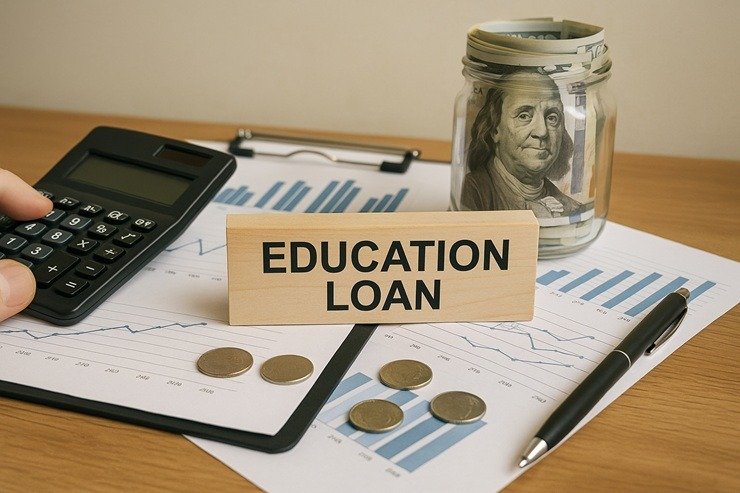Money
How Education Loan Repayment Affects Your Financial Future

Education loans can make you relieved about all the heavy expenses. It is a valuable tool for financing higher education, but their repayment can shape your financial future. Understanding how to manage these loans effectively is crucial for long-term financial health.
This blog will help you get a better understanding of how education loan repayment can impact your finances. It will also give you insights about budgeting, credit scores and future financial planning.
1. Impact on Monthly Budget and Cash Flow
Education loan repayments typically require fixed monthly payments, which can imbalance your monthly budget. Especially when you are at the initial stage of your career you will be stressed about your finances when your income is limited.
These payments reduce your monthly income and affect your ability to save, invest, or spend on other priority items like finding affordable student apartments in the US. The challenges you will face—
Budgeting Challenges: A significant portion of your income may go toward loan payments. For example— A $10,000 loan with a 7% interest rate over 3 years could require monthly payments of around $313. It will leave less for other expenses.
Opportunity Costs: Money spent on loan repayments could have been invested elsewhere.
Tip: The tip is to create a detailed budget beforehand and prioritize loan payments. Set funds for saving and emergencies aside.
2. Impact on Credit Score
Credit score plays an important role in your financial life because it influences your ability to secure mortgages, car loans or favorable interest rates. Education loan repayment plays a pivotal role here—
Positive Impact: Consistent, on-time payments show financial responsibility, it boosts your credit score over time. A strong credit score can open doors to better loan terms and lower interest rates in the future.
Negative Impact: Missed payments or defaulting on your loan can severely damage your credit score. Late payments stay on your credit report for up to seven years which makes it harder to borrow money or secure favorable terms.
Tip: Set up automatic payments to ensure you never miss a due date.
3. Why It Matters for Your Future
Paying back your education loans is a big deal as it affects your future plans. For example, if you want to buy a house, save for a vacation or for living expenses, it gets difficult for you to adjust.
Saving Money: If you pay extra toward your loan when you can, you’ll pay less interest over time and finish paying it off faster.
Tip: Try to pay a little extra on your loan when you have spare cash. Even small extra payments can save you money in the long run.
4. Career and Life Choices
Education loan repayment actually can actually impact your career and life choices. It can impact your personal as well as professional life.
Career Flexibility: High monthly interest rates can make you unsatisfied in your career, you may have to put more effort for less pay at the end of the day. You might end up choosing work that you are less passionate about because of money.
Delayed Milestones: Loan repayments can delay major goals like buying a house, car etc.
Mental Stress: Stress is also the factor which happens a lot while repaying the debt.
5. Tax Implications
Education loan repayment can have tax benefits, but these depend on your situation:
Student Loan Interest Deduction: In the U.S., you may be able to deduct up to $2,500 of student loan interest paid annually but on a higher income level it may not be possible.
Tip: Consult a tax professional to understand how your loan repayments affect your taxes.
Conclusion
An education loan is not just a monthly payment or a bill— it’s a long-term commitment that shapes your financial future. Understanding its impact on your credit, budget, potential of building wealth, life choices will help you in making informed decisions to manage your expenses.
Planning at this stage is very crucial as there is a chance of stressful budgeting decisions. With strategic planning and proactive measures, you can pay off your loans while building a strong financial foundation for the future.
-

 Quotes3 years ago
Quotes3 years ago53 Motivational Gym Quotes to Fuel Your Workout
-

 Quotes10 years ago
Quotes10 years ago50 Most Powerful Quotes Ever Spoken
-

 Motivation5 years ago
Motivation5 years ago4 Fun New Hobbies To Try This Year
-

 Quotes2 years ago
Quotes2 years ago43 Inspirational Quotes About Thoughts
-

 Quotes3 years ago
Quotes3 years ago105 Motivational Quotes by Famous People
-

 Quotes11 months ago
Quotes11 months ago100 Motivational Quotes to Inspire You in 2025
-

 Quotes1 year ago
Quotes1 year ago77 Morning Motivational Quotes to Kickstart Your Day
-

 Education11 months ago
Education11 months agoHow to Motivate Yourself to Study: 6 Proven Techniques






























